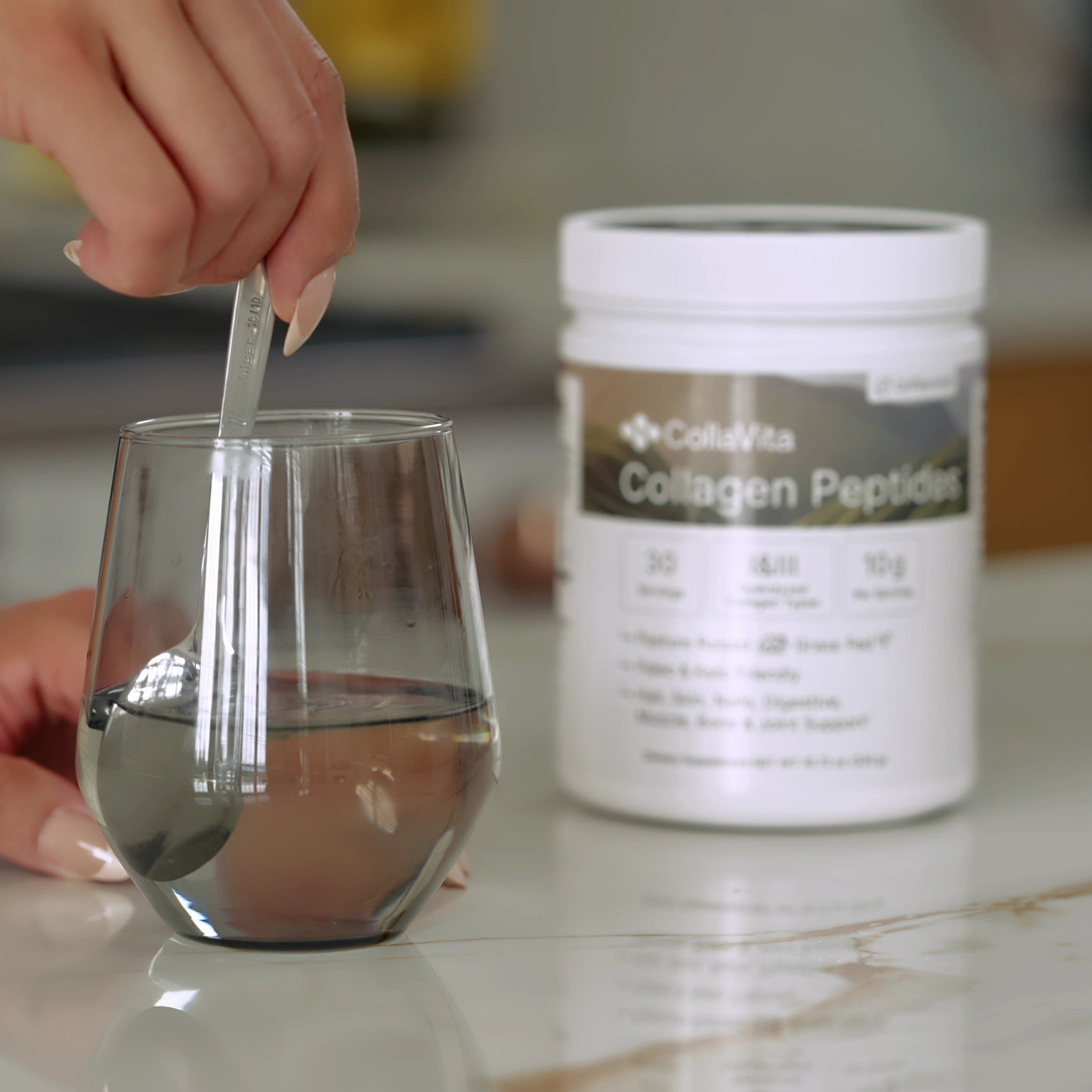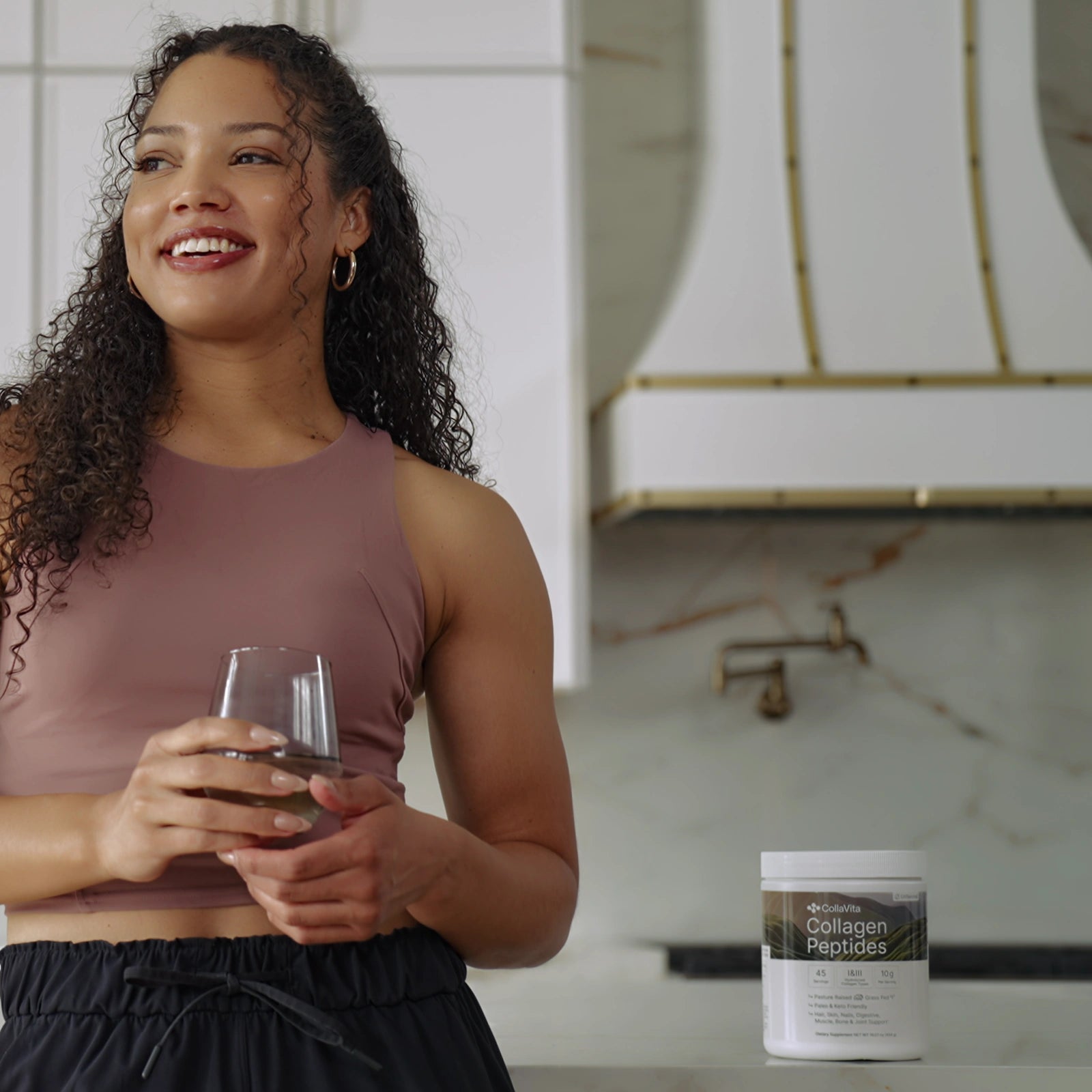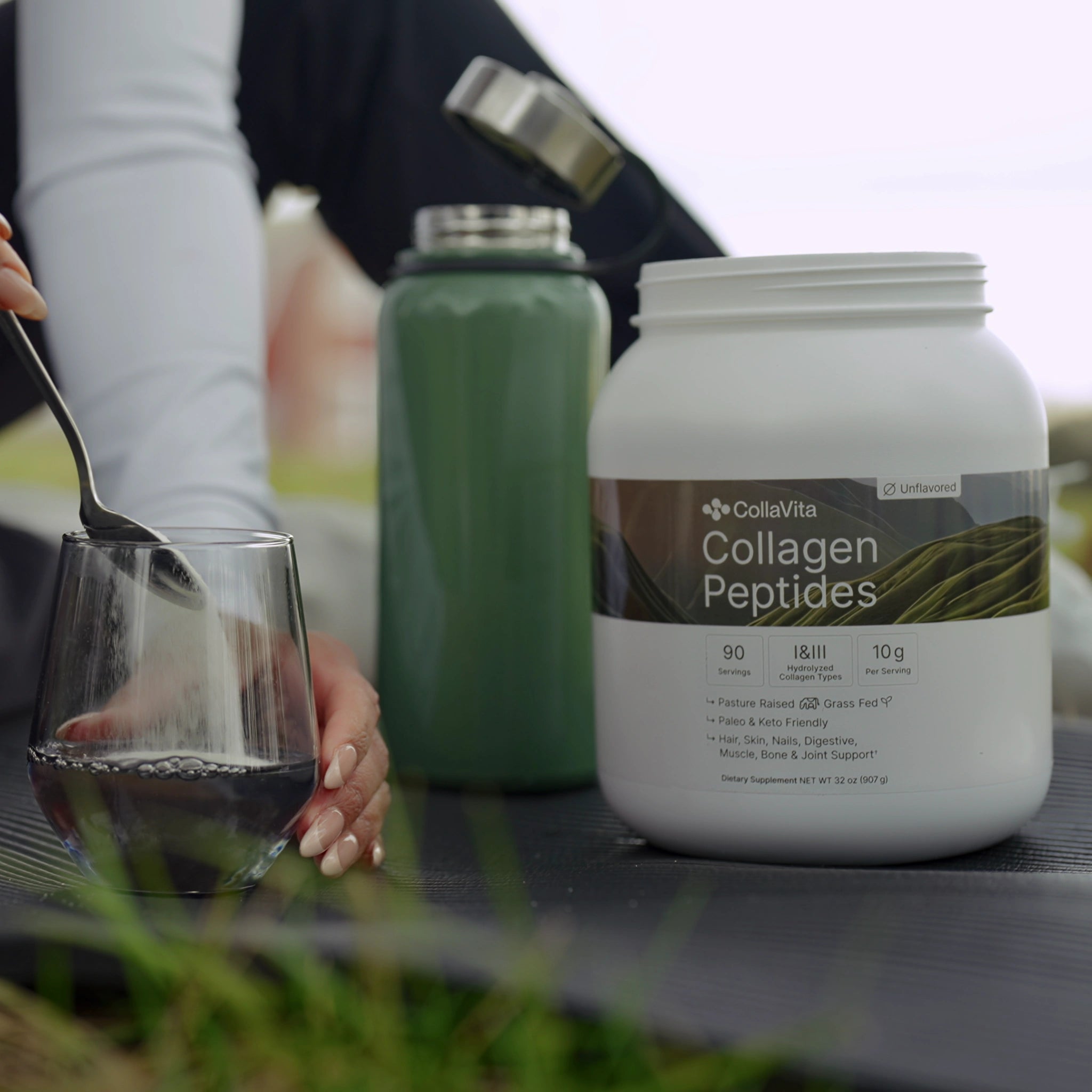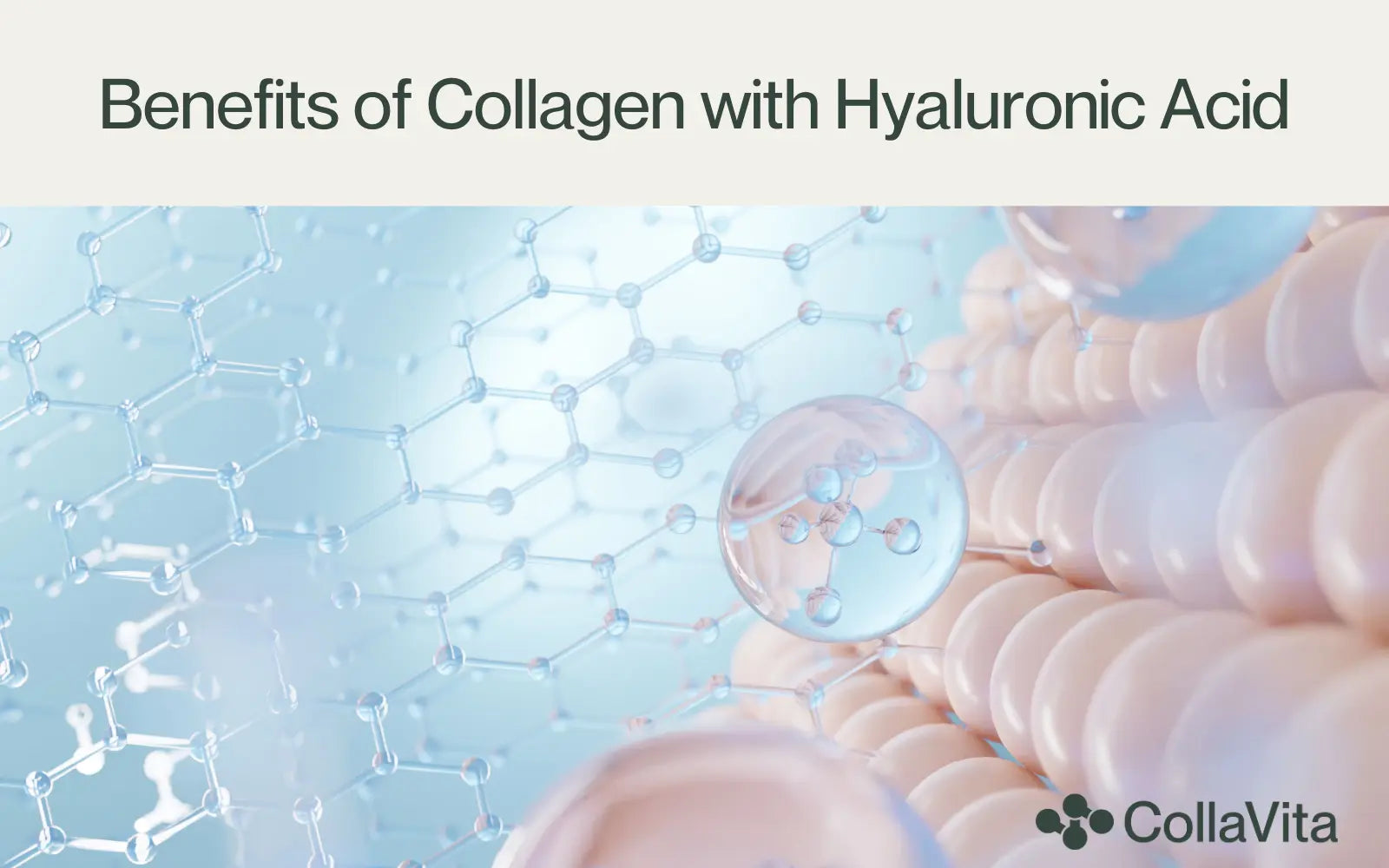What is Liquid Collagen?
Liquid vs. Powdered or Capsule Collagen
- Powdered collagen is commonly mixed into smoothies, coffee, or food. While effective, it may be less portable than single-dose liquid bottles.
- Capsule collagen must dissolve in the stomach before absorption begins, which might delay uptake. However, no strong clinical evidence proves that capsules absorb significantly worse than liquid forms. This claim is often marketing-driven.
- Liquid collagen is pre-dissolved and often hydrolyzed, which means the collagen proteins are broken down into smaller peptides that the body can absorb more easily.
Does Liquid Collagen Absorb Better?
While some brands claim 90–95% absorption rates for liquid collagen, no peer-reviewed studies confirm this specific figure. Instead, what research does support is that hydrolyzed collagen peptides—regardless of format (liquid, powder, or capsule)—are better absorbed than unhydrolyzed collagen.
- A 2015 study by Iwai et al.(1) found that small collagen peptides (di- and tri-peptides) appear in the bloodstream within hours of ingestion.
- According to Zague et al., 2018(2), hydrolyzed collagen is effectively absorbed and can influence skin and joint health—but not necessarily faster in liquid form compared to powder or capsules.
How Does Liquid Collagen Work?
The Benefits of Liquid Collagen

Skin Health
Hydrolyzed collagen may help improve skin elasticity, hydration, and firmness.
- A 2018 clinical trial by Anna Czajka et al., published in J Clin Interv Aging(5), showed that women who took a drinkable supplement with hydrolyzed fish collagen, vitamins, and antioxidants daily for 12 weeks had smoother, more hydrated skin and improved collagen fiber structure.
- Another double-blind, placebo-controlled study by Proksch et al., 2014(6), found that daily collagen peptide intake improved skin elasticity in women aged 35–55 after 8 weeks.
Joint Health
Collagen may help reduce joint discomfort and support mobility, especially in older adults or active individuals.
- A study by Clark et al., 2008(7), involving athletes with joint pain, found that taking 10 g of collagen hydrolysate daily for 24 weeks led to significant improvements in joint pain.
Nail and Hair Health
While anecdotal evidence suggests improvements in hair thickness and nail strength, current human studies are limited. More research is needed to confirm these benefits.
The liquid crystal (LC) hydrogel study you mentioned (Royal Society of Chemistry, 2021)(8) focused on nerve regeneration in lab conditions, not on cosmetic collagen supplements. That research is not directly related to over-the-counter liquid collagen benefits.
Clarification: The LC-based materials discussed are being explored for biomedical applications, not for beauty or dietary collagen supplements.
Wound Healing
Some small studies suggest that collagen peptides might help support wound healing by promoting tissue repair. However, most research has been done using topical collagen or medical-grade materials, not oral supplements.
More high-quality human trials are needed before strong claims can be made about liquid collagen and wound healing.What are the 5 Best Liquid Collagen?
1. Vital Protein Marine Collagen
Type: Marine Collagen Peptides (Type I)
Source: Scales of wild-caught, non-GMO white fish (cod)
Key Features:
- 12g collagen peptides per serving
- Supports skin elasticity, hair, nails, bones, and joints
- Free from dairy and gluten; pescatarian-friendly
- Neutral taste; mixes easily into hot or cold liquids
2. NeoCell Super Collagen C Type I and III - 250 Tablets
Type: Hydrolyzed Collagen Types I & III
Source: Bovine hide
Key Features:
- Includes Vitamin C to enhance collagen synthesis
- Supports skin, hair, nails, and joint health
- Available in tablet and powder forms
3. Ancient Nutrition Organic Bone Broth
Type: Bone Broth Collagen (primarily Type II)
Source: Chicken bone broth
Key Features:
- Contains glucosamine, chondroitin, and hyaluronic acid
- Supports joint, gut, and skin health
- Paleo-friendly and free from common allergens
4. Rejuvicare Liquid Collagen Beauty Formula with Amino Acids
Type: Hydrolyzed Collagen Peptides
Source: Not specified
Key Features:
- Infused with biotin, amino acids, and D-panthenol
- Grape-flavored liquid supplement
- Aims to support skin hydration, hair strength, and nail health
5.Live Conscious Liquid Collagen
Live Conscious offers a premium liquid collagen supplement derived from grass-fed, pasture-raised bovine sources. This product is designed to support skin elasticity, joint health, and overall beauty. Enhanced with Vitamin C, it aids in boosting natural collagen production in the body, ensuring easy absorption for maximum effectiveness.
Type: Liquid Collagen (primarily Type I & III)
Source: Grass-fed, pasture-raised bovine
Key Features:
- Supports skin elasticity and joint health
- Includes Vitamin C to boost natural collagen production
- Easy to absorb for quicker results
- Free from common allergens and additives
How to Take Liquid Collagen?
Dosage: Most liquid collagen products recommend a daily intake of 10–20 mL. Always follow the manufacturer's instructions.
Consistency: Regular daily use is crucial. Improvements in skin elasticity and hydration may be noticeable after 8–12 weeks of consistent use.
Enhance Absorption: Taking collagen with vitamin C can boost its effectiveness, as vitamin C plays a role in collagen synthesis.
Timing: There's no definitive best time to take collagen. Choose a time that fits your routine to ensure consistency.
Lifestyle Factors: For optimal results, maintain a balanced diet, stay hydrated, and avoid habits that can degrade collagen, like smoking.
Factors to Consider When Choosing Liquid Collagen
- Marine Collagen: Derived from fish, it has high bioavailability and is rich in Type I collagen, beneficial for skin, hair, and nails.
- Bovine Collagen: Sourced from cows, it contains Types I and III collagen, supporting skin, hair, nails, and joint health.
2.Type of Collagen:
- Type I: Supports skin, hair, and nails.
- Type II: Benefits cartilage and joint health.
- Type III: Often found with Type I, contributes to skin elasticity and firmness.
3.Hydrolyzed Collagen: Also known as collagen peptides, this form is broken down into smaller peptides for easier absorption.
4.Additional Ingredients: Some products include hyaluronic acid, vitamins, or minerals to enhance benefits.
5.Quality and Purity: Opt for products free from artificial additives, fillers, and allergens.
6.Sustainability: Choose brands that prioritize ethical and sustainable sourcing.
7.Flavor: Select a flavor you enjoy to make daily consumption pleasant.
8.Brand Reputation: Research customer reviews and brand credibility to ensure product efficacy.
9.Cost and Value: Consider the price per serving and the concentration of collagen and other beneficial ingredients.
What are the Potential Side Effects of Liquid Collagen?
- Allergic reactions: An allergic reaction could occur if you have a history of severe reactions to the foods that contain collagen, such as fish or beef.
- Digestive problems: Some individuals may have gas, bloating, or diarrhea as a digestive issue.
- Skin reactions: In extremely unusual circumstances, it might lead to a rash, acne, or inflammation of the skin.
Is Liquid Collagen Vegan?
Traditional liquid collagen is not vegan, as it's derived from animal sources like fish or cows. However, vegan alternatives aim to support the body's collagen production using plant-based ingredients rich in amino acids and vitamin C.
What are The Sources of Liquid Collagen?
Marine Collagen: Sourced from fish skin and scales; high in Type I collagen.
Bovine Collagen: Derived from cow hides and bones; contains Types I and III collagen.
Porcine Collagen: Obtained from pig skin; similar in composition to bovine collagen.
Each type offers unique benefits, so choose based on your health goals and dietary preferences.
What is the Best Liquid Collagen for Women?
Conclusion
(6) - Proksch E, Schunck M, Zague V, Segger D, Degwert J, Oesser S. "Oral intake of specific bioactive collagen peptides reduces skin wrinkles and increases dermal matrix synthesis." Skin Pharmacology and Physiology. 2014;27(3):113–119. doi: 10.1159/000355523.
(7) - Clark KL, Sebastianelli W, Flechsenhar KR, et al. "24-Week study on the use of collagen hydrolysate as a dietary supplement in athletes with activity-related joint pain." Current Medical Research and Opinion. 2008;24(5):1485–1496. doi: 10.1185/030079908X291967.
(8) - Raveendran, R. L., & Anirudhan, T. S. (2021). Development of macroscopically ordered liquid crystalline hydrogels from biopolymers with robust antibacterial activity for controlled drug delivery applications. Polymer Chemistry, 12(27), 3992–4005.

















